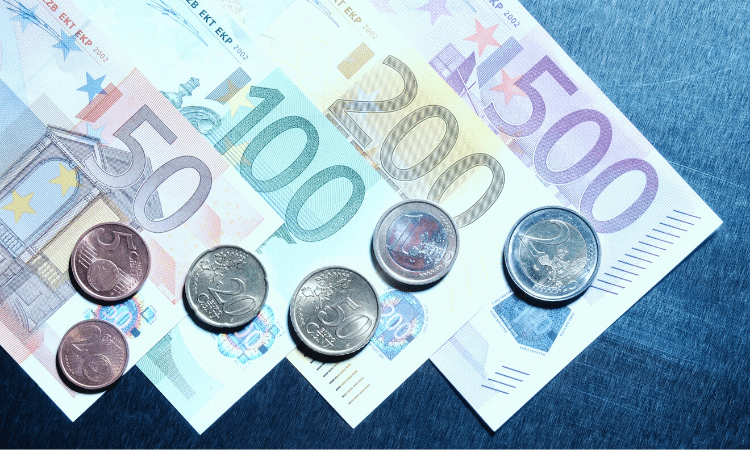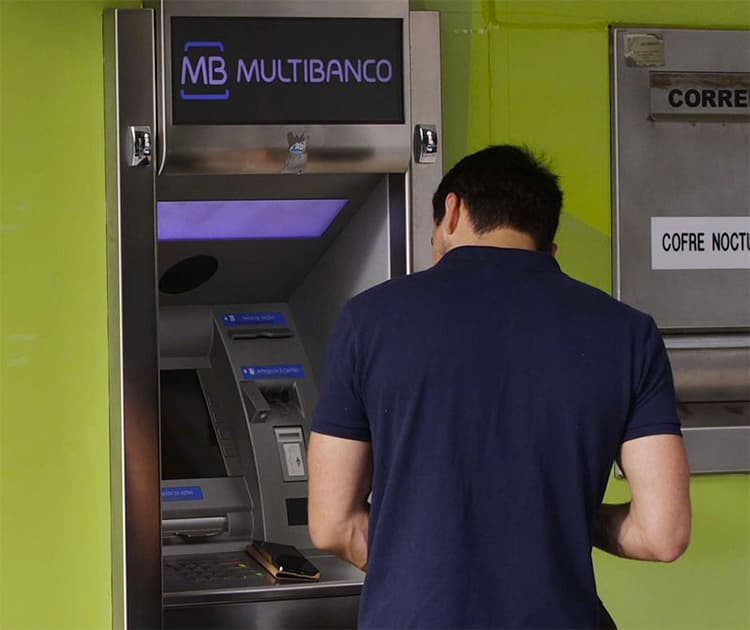The currency used in Portugal is the euro, just as in most other EU countries. This makes it an easy vacation spot for visitors from other EU countries, since they don’t have to deal with changing money in Portugal.
Portugal’s been on the euro for decades, so you’ll see the euro symbol on any price tag. It looks like this: €.

Currency in Portugal
Throughout Portugal, you’ll see seven bank notes and eight coins in different amounts. Portugal currency comes in 5, 10, 20, 50, 100, 200, and 500 euro bills. You’ll also see 1-cent, 2-cent, 5, 10, 20, and 50-cent coins, as well as coins for €1 and €2. From experience, those €1 and €2 coins come in most handy when out and about for the day.
All euro bills and coins, regardless of denomination, have a general European design on one side and a country-specific design on the other side (similar to the US quarters with different state designs on one side). Regardless of the design, the currency can be used in any Eurozone country.
History buffs might be interested to know that Portugal’s official currency before the euro was the escudo, with 200 escudos equalling about 1 euro.
One thing you’ll notice in Portugal is a difference in written amounts. Large amounts of money show a decimal point where Americans are used to seeing a comma. Conversely, there’s a comma between euros and cents, instead of a decimal point. So, if you’d usually write $10,500 or $1.25 in the US, you’d write €10.500 or €1,25 in Portugal. It’s also common to see the € sign after the amount, like so: 1,25€.
Money in Portugal
Whether you’re an expat or tourist, you’ll see money spent in Portugal. While credit and debit cards are generally accepted, Portugal is a cash-centric country — especially when you get outside of cities like Lisbon and Porto.
Here’s a quick rundown of everything you need to know about cash in Portugal: what kind of money Portugal uses, how to change money in Portugal, and even the best way to send money to Portugal.
Carrying cash in Portugal
Here’s an important tip: Try to keep smaller bills or a few €1 or €2 coins with you all the time. Especially in smaller shops like a café or pastelaría, you can run into problems trying to pay with larger denominations — even a €20.
While it’s fairly common in the US to break large bills by making a small purchase, it’s unexpected in Portugal. If you need to do that (and you probably will) try buying something at a chain store or a very busy restaurant. They’ll be more likely to help you out.
Planning to visit Portugal and have no clue on which travel insurance to pick?
Check out these options:
World Nomads
Simple and flexible travel insurance, even if you've already left home.
Get a quote: [ins-worldnomads]
HCCMIS Atlas Travel
Built for individuals traveling outside their home country for more than 5 days – includes coverage for COVID-19 (SARS-CoV-2)*
Get a quote: [ins-hccmis]
Planning to visit Europe? Get Schengen Zone Insurance
Check out these options:
Axa Travel Insurance
Extensive protection and 24-hour assistance
Get a quote: [ins-axa]
Europe Travel Schengen
The number 1 global insurance with 24-hour assistance
Get a quote: [ins-schengen]
Looking for the best health insurance in Portugal?
Check out these options:
Cigna Global Health Insurance
Get access to an extensive global network with 24/7 multi-lingual support, in-house clinical treatments, and more.
Get a quote: [ins-cigna]
Allianz Worldwide Care
Your medical expenses will all be covered when living abroad.
Get a quote: [ins-allianz]
How to get cash: Portugal ATMs
Like other EU countries, Portugal has ATMs throughout the country. You’ll see them at the airport, banks, and along the streets of the cities. Smaller towns will have at least a couple of ATMs, as well.
Keep an eye out for ATMs when you’re visiting Portugal, because no matter where you go, Portugal is a cash-centric country.
Depending on your bank and your home country, you might never see a familiar ATM in Portugal. But never fear; you’ve got options that will work like any ATM back home. Just look for Multibanco ATMs — on the street or in any Portuguese bank — and you’ll do fine.

The standard ATM limit in Portugal is generally €400 per day. But be prepared – your ATM might limit you to €200 per withdrawal. If so, try making a second withdrawal, even at the same machine, to get to the €400 limit.
Learn more about Portugal ATMs in our full-length article, ATMs in Portugal: Withdrawal Limits, Fees, and All You Need to Know when Visiting Portugal.
How to transfer money to Portugal
For both expats and visitors, TransferWise is our favorite platform for international money transfers. Here are a few reasons why:
- Fair exchange rates
- Security and reliability
- Ease of use
- Suitable for any size transfer, from petty cash to large sums
One of the best features of TransferWise is the Borderless Account card you’ll receive. It’s a debit card, so it works in Portugal ATMs and many in-store points of sale. The cool part is, visitors who want to transfer Portugal money to USD can have a single TransferWise account set up in both their home currency and the euro. This multi-currency account can save you quite a bit in international exchange fees.
Read more about the best ways to send money to Portugal in our full article: How to Send Money to Portugal: A Guide to Save You Time and Money.
How much money do you need in Portugal?
According to Numbeo, consumer prices in Portugal are significantly lower than in the US, the UK, or any of Portugal’s larger EU siblings. You’ll probably be pleasantly surprised at the amount of money you spend in Portugal. In fact, one of the main draws for expats who move here is the amount of money you need to retire in Portugal.
Roughly speaking, you can plan on prices for the following:
- A pastry and a cafézinho (espresso) at a small café: €2 – €3
- Lunch at a restaurant: €10 – €15
- Dinner for two with wine: €30 – €60 (depending on how fancy you want to be)
- A bottle of (actually very drinkable) wine from a supermarket: €2 and up
Is it safe to carry money in Portugal?
Absolutely. Portugal is one of the safest countries in Europe. In fact, it’s ranked as the 13th safest country in the world. Crime rates are generally very low. Pickpockets are probably the most common problem, particularly in tourist-heavy areas.
Our best advice is to use common sense, as you would in any city, and keep an eye on your bags and backpacks.
